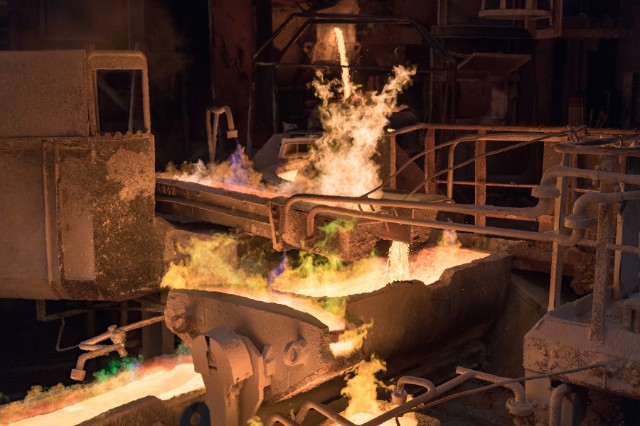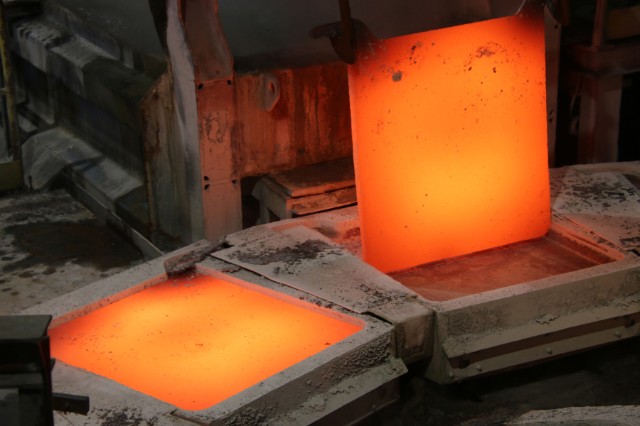
Press Release
H2-ready: Aurubis investing in hydrogen-capable anode furnaces in the Hamburg plant
Hamburg | Saturday, August 5, 2023


- Investment volume of about € 40 million in preparations for using hydrogen instead of natural gas in metal processing
- New technology in copper production provides potential savings of 5,000 t of CO2 per year in Hamburg
- CEO Roland Harings: “We are achieving another milestone in our decarbonization strategy”
Aurubis already produces copper with less than half the average global carbon footprint today. Furthermore, the company has committed to an ambitious CO2 reduction target of 50 % for Scope 1 and Scope 2* emissions for 2030 as part of the Science Based Targets initiative. Aurubis is consistently gearing up for the hydrogen age: The multimetal and recycling specialist’s Hamburg plant will be one of the first copper smelters in the world to use hydrogen instead of natural gas for the reduction process in its anode furnaces. With the investment of about € 40 million, Aurubis is taking another important step in the transformation towards carbon neutrality with the new technology that provides a savings potential of around 5,000 t of CO2 per year when only hydrogen is used.
The conversion in the Hamburg plant will be carried out as part of the plant’s routine maintenance shutdown slated for spring 2024. In addition to decarbonizing production, the new furnaces will improve process flexibility as well. Compared to the current equipment, the new furnace technology enables the processing of more complex metal-bearing copper concentrates. This will help Aurubis in Germany extract additional valuable raw materials even more efficiently in the future to satisfy rising demand coming from electric vehicles, for example.
The new anode furnaces will play a vital role in the copper production process in Hamburg. Currently, unwrought copper is processed using natural gas, which generates significant volumes of carbon dioxide (CO2). By using hydrogen (H2) as a reducing agent in the future, at least 5,000 t less CO2 will be emitted in the Hamburg plant each year.
“By replacing the anode furnaces, we are achieving another milestone in our decarbonization strategy,”
said Aurubis AG CEO Roland Harings.
“For now, there is still barely enough green hydrogen to cover German industry’s huge demand at competitive prices. With this step, we’re leading the way and showing that we’re prepared!”
The new anode furnaces will help to further decarbonize Aurubis’ production even before enough hydrogen comes on the market, as they work more efficiently and consume about 30 % less natural gas, for a potential savings of nearly 1,200 t of CO2 per year. On top of the clear benefits for the climate, replacing the anode furnaces provides a technological boost for the more efficient extraction of valuable metals from metal concentrates and recycling materials. This includes nickel, an important raw material in electric car batteries.
While conceptualizing the ambitious anode furnace project, the company relied on internal expertise to a great extent. “The new furnace area’s H2 readiness is 100 % ‘Made by Aurubis’,” Harings emphasized.
“With the new anode furnaces, we’re demonstrating our determination and our courage to apply real innovations to our processes and, as a company with nearly 160 years of history at the Hamburg site, to continue taking on new challenges.”
In May 2021, Aurubis showed that hydrogen can be successfully used in production. A pilot project at the Hamburg plant produced copper anodes using hydrogen instead of natural gas – the first use of hydrogen on an industrial scale.
Aurubis has pursued the strategic goal of consistently minimizing the impacts of production on the environment and climate for a long time. This clear focus on sustainability has paid off: Aurubis produces a number of metals with less than half the average CO2 emissions of its global competitors. The carbon footprint of the main product, copper cathodes, has decreased by 36 % since 2013. Furthermore, the footprint of its plants is more than 60 % lower than the global industry average. The figures for tin are even better: Aurubis is 76 % below the global average. The company’s target is for production to be carbon-neutral well before 2050.
Downloads
-
Um die heruntergeladene Komponente zu sehen den QR code scannen
Press Release as PDF
PDF
1 MB
